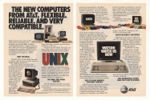Difference between revisions of "UNIX"
m (+links) |
m (→External links: +Unix and Multics) |
||
| Line 59: | Line 59: | ||
* [https://wiki.tuhs.org/doku.php?id=start The Unix Heritage Wiki] | * [https://wiki.tuhs.org/doku.php?id=start The Unix Heritage Wiki] | ||
* [https://www.princeton.edu/~hos/Mahoney/unixhistory An Oral History of Unix] - Lengthy interviews with Thompson, Ritchie, McIlroy, etc | * [https://www.princeton.edu/~hos/Mahoney/unixhistory An Oral History of Unix] - Lengthy interviews with Thompson, Ritchie, McIlroy, etc | ||
| + | * [https://multicians.org/unix.html Unix and Multics] | ||
===Fun links=== | ===Fun links=== | ||
Revision as of 02:55, 27 June 2022
| UNIX | |
| Type: | Time-sharing |
|---|---|
| Creator: | Ken Thompson, Dennis Ritchie and Douglas McIlroy at Bell Labs |
| Multitasking: | Multi-tasking with swapping/paging (latter added in a later version) |
| Architecture: | Originally PDP-7, then PDP-11; now cross-platform. |
| Date Released: | 1969 |
Unix (officially trademarked as UNIX® - the documentation switched from using 'UNIX' to 'Unix' as of V7) is a computer operating system originally developed in the 1970s by a group of AT&T employees at Bell Labs including Ken Thompson, Dennis Ritchie and Douglas McIlroy.
Today's Unix systems are split into various branches, developed over time by AT&T as well as various commercial vendors and non-profit organizations. A number of clones of Unix, which share the interfaces, and 'look and feel', but no code, have also been produced; most notably, Linux.
Notable versions
Versions of relevance for hobbyists include (note that 'Version' in early UNIXes refers to the revision of the 'UNIX Programmer's Manual'; UNIX didn't really have coordinated distros before about V6):
- Unix "version 0" for PDP-7
- UNIX V1 - The first version of UNIX that has been recently made to run on the PDP-11
- UNIX V3 - The first version with pipes
- UNIX V4 - The first version with the kernel written in C
- UNIX V5 - The first version with complete source and binaries available
- UNIX V6 - The first widely distributed version; the last before branches started to appear
- Unix V7 - One of the most complete, and the last generally available and PDP-11 version of Research UNIX
- Unix/32V - A port of Seventh Edition to the VAX-11/780
Unix then went commercial and was sold, in a number of releases. (Below is an early ad for AT&T UNIX.)
CSRG releases
Meanwhile the Computer Systems Research Group kept on releasing newer BSD UNIX's, mostly for the VAX, derived from 32V. These had wide distribution, and tremendous impact; they were a major step in UNIX's road to its current ubiguity.
Descended from there are several popular versions:
- FreeBSD focuses on providing a system geared towards a single user.
- NetBSD will run on a variety of 32-bit older systems from the VAX to the Amiga.
- OpenBSD derived from the NetBSD project will run on all kinds of systems.
See also
External links
- The Unix Heritage Society
- The Unix Tree - Complete source for many early versions of Unix
- The Unix Heritage Wiki
- An Oral History of Unix - Lengthy interviews with Thompson, Ritchie, McIlroy, etc
- Unix and Multics
Fun links
- The Unix Power Classic: A book about the Unix Way and its power - Hacker-oriented version of the Dao De Jing
- Rootless Root: The Unix Koans of Master Foo
| v • d • e UNIX Versions, Vendors and Related |
|---|
| Research Unix PDP-7 UNIX • V1 • V2 • V3 • V4 • V5 • V6 • V7 • V8 • V9 • V10 • LSX • MINI-UNIX • Unix/32V
AT&T - CB-UNIX • PWB/UNIX • USG UNIX • System III • System IV • System V BSD - 2.9 BSD • 2.10 BSD • 2.11 BSD • 3BSD • 4BSD • 4.1 BSD • 4.2 BSD • 4.3 BSD • 4.4 BSD BSD Descendants 386BSD • NetBSD • FreeBSD • OpenBSD • NeXTSTEP • Darwin |
| Other - xv6 • AMIX • SunOS • Solaris • ULTRIX • A/UX • XENIX • AIX • Dell UNIX |
